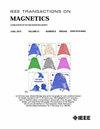转子铸造缺陷检测器的优化设计与实验分析
IF 2.1
3区 工程技术
Q3 ENGINEERING, ELECTRICAL & ELECTRONIC
引用次数: 0
摘要
感应电机的转子通常称为鼠笼转子,是通过压铸工艺制造的。鼠笼转子由转子铁芯、导体杆和端环组成,采用铝或铜压铸工艺制造。工业应用中使用的大多数感应电机都配备了鼠笼转子,这是因为鼠笼转子易于大规模生产。然而,通过压铸工艺制造转子时,气体会进入导体棒和端环区域,形成气孔和收缩腔。这些缺陷会对转子的质量产生不利影响。它们可能会导致后处理和装配过程中出现问题。当转子铸造缺陷出现时,这些问题会增加材料成本和时间损失。因此,本研究提出了一种能在转子制造过程中及时发现铸造缺陷的模型。此外,该模型还通过优化检测器核心的几何形状,增强了检测信号的大小和波形,确保在相同工作条件下性能一致。在之前研究的探测器模型基础上,设计并制造了一个改进的原型模型,并对有限元分析(FEA)和实验结果进行了比较,以验证分析技术的有效性。此外,还优化了转子铸造缺陷检测器的核心形状,并对优化模型的检测信号进行了分析,并与有限元分析结果进行了比较。对优化检测器模型检测信号的快速傅立叶变换(FFT)分析表明,与初始模型相比,基波幅度增加了十倍以上,总谐波失真(THD)降低了 36% 以上。本文章由计算机程序翻译,如有差异,请以英文原文为准。
Optimal Design and Experimental Analysis of Rotor Casting Defect Detector
The rotor of an induction motor, commonly known as a squirrel cage rotor, is manufactured via the die-casting process. The squirrel cage rotor comprises a rotor core, conductor bars, and end rings manufactured using either aluminum or copper via the die-casting process. Most induction motors used in industrial applications are equipped with squirrel cage rotors, which are advantageous owing to the ease of their mass production. However, when a rotor is manufactured via die casting, gas is introduced into the conductor bar and end ring areas, forming pores and shrinkage cavities. These defects adversely affect the quality of the manufactured rotors. They may result in problems during post-processing and assembly. When rotor casting defects are present, these problems can increase material costs and time loss. Therefore, this study proposes a model that can promptly detect casting defects when a rotor is manufactured. Additionally, the model enhances the size and waveform of the detection signal by optimizing the geometry of the detector core, ensuring consistent performance under the same operating conditions. An improved prototype model was designed and manufactured based on a previously studied detector model, and finite element analysis (FEA) and experimental results were compared to verify the validity of the analysis technique. Moreover, the core shape of the rotor casting defect detector was optimized, and the detection signal of the optimized model was analyzed and compared with that of the FEA. A fast Fourier transform (FFT) analysis of the detection signal of the optimized detector model shows an increase of more than ten-fold in the magnitude of the fundamental wave and more than 36% reduction in the total harmonic distortion (THD) compared to the initial model.
求助全文
通过发布文献求助,成功后即可免费获取论文全文。
去求助
来源期刊

IEEE Transactions on Magnetics
工程技术-工程:电子与电气
CiteScore
4.00
自引率
14.30%
发文量
565
审稿时长
4.1 months
期刊介绍:
Science and technology related to the basic physics and engineering of magnetism, magnetic materials, applied magnetics, magnetic devices, and magnetic data storage. The IEEE Transactions on Magnetics publishes scholarly articles of archival value as well as tutorial expositions and critical reviews of classical subjects and topics of current interest.
 求助内容:
求助内容: 应助结果提醒方式:
应助结果提醒方式:


